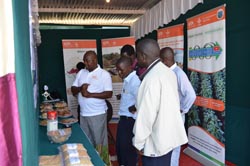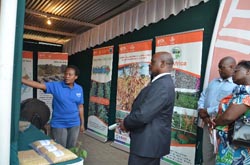- A second demand driven training-of-trainers workshop on harvesting and post-harvest management of legumes was conducted in May 2014 in collaboration with the Ministry of Agriculture and Food Security’s Department of Agricultural Research Services (Crop Storage). Twenty-five extension workers comprising of 21 men and 4 women were trained.
- A Stakeholder Conference hosted by N2Africa-Malawi was held on the 5th of June 2014, in Lilongwe, Malawi. The meeting reviewed achievements and challenges of Phase I and mapped the best way forward for Phase II. The conference drew 37 participants (9 women and 28 men) from World Vision Malawi, National Smallholder Association of Malawi (NASFAM), Catholic Development Commission of Malawi (CADECOM of the Catholic Relief Services), Department of Agricultural Research Services (DARS), Department of Agricultural Extension Services (DAES) in the Ministry of Agriculture and Food Security, Agri-Input Suppliers Limited (AISL), Malawi Mangoes Limited, CIAT, ICRISAT, IITA, AGRA, and Malawi Oilseed Sector Transformation.
- N2Africa-Malawi in collaboration with personnel from the Ministry of Agriculture and Food Security (DARS and DAES) developed two training and dissemination materials on two thematic topics titled 1) Soyabean production and 2) Inoculants: importance and how to use; by way of adapting/adopting available information. Translation into local language was also done and leaflets based on the second topic were produced and are being distributed.
- Hosting of an MSc student: successfully hosted Hyejin Lee, an MSc student from Wageningen University from April to June 2014. She did a survey on the ‘Impact of legume technology of N2Africa on food security and livelihood’.
-
Participation at the National Agriculture Fair: N2Africa in conjunction with other projects at IITA-Malawi and DARS, participated at the 11th National Agriculture Fair which ran from 28-30 August 2014. The Malawi President, Prof Mutharika, officially opened the Fair. Outputs from the Fair included increased visibility of IITA and its work in Malawi; 281 people patronised the stand comprising 164 males and 117 females; 1000 flyers on IITA’s work in Malawi and 200 flyers on use of inoculants in soyabean production were distributed to the general public. The Malawi Minister of Agriculture and his entourage were briefed on IITA’s work in Malawi.

Lloyd Phiphira of IITA-N2Africa illustrating displays to patrons at the Agriculture Fair in Blantyre

Brenda Sopo of IITA takes the Malawi Minister of Agriculture, Allan Chiyembekeza (in Dark suit) through IITA activities
- Profiling and training needs assessment for agro-dealers: conducted an exercise to up-date and profile as well as assessing training needs for thirty-eight agro-dealers active in the impact districts of Lilongwe, Dedza, Ntcheu, Salima, Dowa, Kasungu and Mchinji. One of the findings during the exercise showed that some agro-dealers who manage to access inoculants (both local and through informal importations) were just displaying the product on the shelf unaware of the consequences of such actions on efficacy of inoculants. Training on handling inoculants will be scheduled once supply of the product in large enough quantities is guaranteed.
- Collaboration between N2Africa and SIMLESA: discussions were held between the two project’s personnel and areas of collaboration such as conducting ToTs on legumes production, inoculants technologies, demonstrations and legume fertiliser trials were identified.
- PPP establishment: execution of plans to commercialise production of local inoculants is on-going; Agri-Input Suppliers Limited with support from Malawi Oilseed Sector Transformation may start brand-packaging and distributing local inoculants (produced at Chitedze) in October 2014.
- Challenges: the biggest challenge is the uncertainty of availability of inoculants to meet soyabean farmers’ demands.
Lloyd Phiphira
